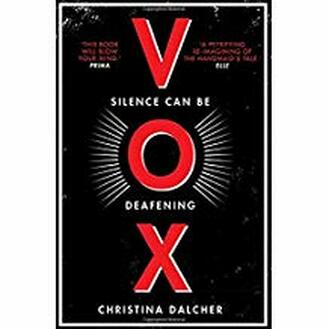 There is something truly chilling about the dystopian world described in Vox (written by Christina Dalcher): nothing in it is too far-fetched to allow readers to put some comfortable distance between such a terrifying future and their present. Our guide through this new reality is Jean: a successful linguist who saw her rights and professional life stripped away when a new – deeply religious – government took over the running of her country. We follow her as she struggles to adapt to her new reality, where women have been turned into no more than passive dolls, meek and mute. Females of all ages have been fitted with a counter on their wrist, which means they receive electric shocks if they utter more than their daily quota of words: 100. Robbed of their voices, the cruelty doesn’t stop there: they are taught the barest essentials at school and words are out of their reach even when they are not audible, as they are not allowed to write or read. Jean can easily grasp how, within a generation, women won’t even know what they have lost, as this distorted reality will become the new, undisputed, normal – her own little girl’s vocabulary, which she did so much to nurture, is shrinking before her eyes. As a mother of three, Jean finds it heartbreaking to witness how her two boys chatter away happily at the end of a school day, while her young daughter becomes increasingly withdrawn. Such frustration only deepens when she perceives how this toxic new ideology is not rejected more strongly in her household. Events unfold rapidly: like pieces of a puzzle, her family is in danger of breaking apart, so Jean has to make quick decisions in impossible circumstances and navigate her way through soul-destroying dilemmas. She’s performing the difficult juggling act of caring for all of her children – even when they test her unconditional love to the limit – while managing a strained marriage and being a strong moral support for her sick elderly parents, who live abroad. Is Jane a hero? She doesn’t see herself as one – she’s certainly never portrayed as perfect and she bitterly regrets her previous political apathy. But when the opportunity arises, she knows that she has to make the right choice because her actions will have repercussions that won't be confined to her household, but spread across the world. Vox is the type of book which will keep you turning the pages, desperate to keep up with the events and find out if Jean will make it through some pretty hair-raising moments. At the end, after the last page has been turned, the story will linger, anger turning to disbelief – why did no more voices condemn the injustices against women? One of the strengths we have as humans is our ability to adapt to circumstances, but that also means that hard-won liberties can be lost in a short space of time if people are passive in their acceptance. Ultimately, it all boils down to one question, which keeps creeping up in the story: what would you do to stay free? It’s a deceptively simple question, which I imagine must usually trigger a knee-jerk reaction: anything, of course. The truly terrifying revelation in this book is the dawning awareness that many might not really mean it.
1 Comment
James
13/3/2019 11:35:28 am
Well, you've convinced me to read it. Such a good idea!
Reply
Leave a Reply. |
AuthorArchives
May 2020
|
Proudly powered by Weebly


